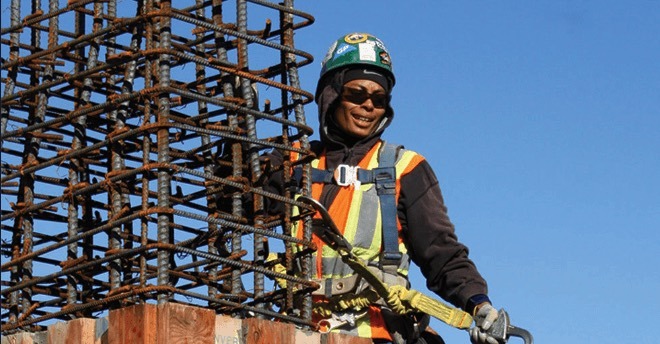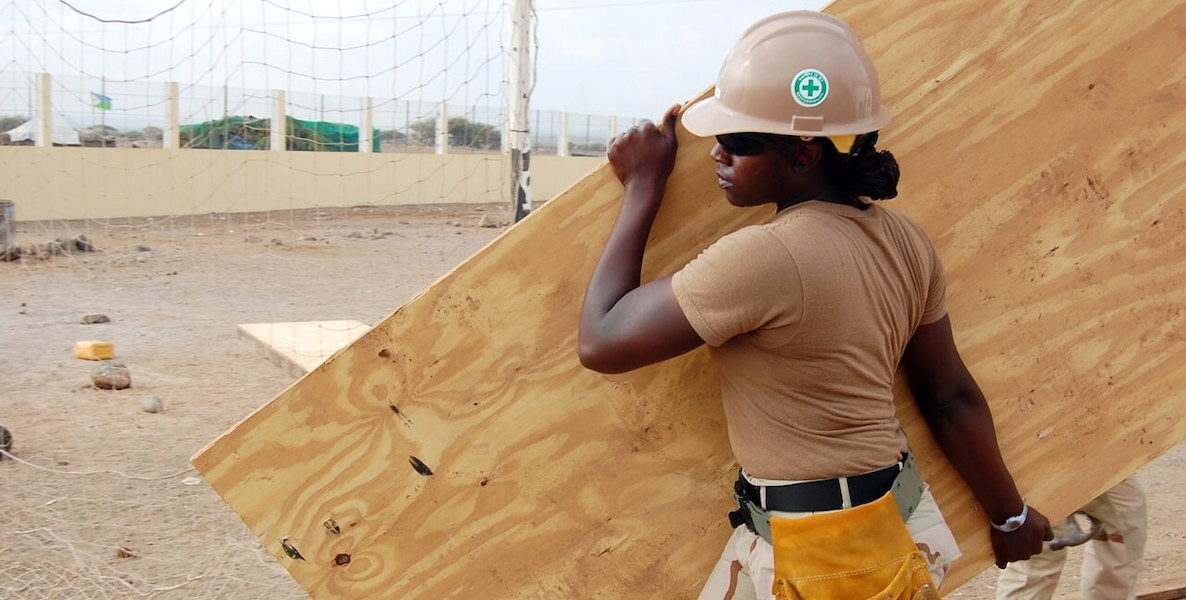Seeing the bright copper curve of the Pavilion at the Hospital of the University of Pennsylvania gives Gina Yiantselis a very particular kind of satisfaction: Inside this building, the finishing details that make a health care and research facility feel comfortable and safe are, in part, the result of her handiwork.
“My first job was really big—the UPenn Pavilion,” Yiantselis recalls. “I was really proud of that. I went in there, and I said to myself: I want to see the job out to the end, or as close to the end as I can get. I got certifications to do certain types of finish work that were going to be in this hospital, and I was there for a long time.”
Yiantselis is a carpenter, one of only 5.5 percent of carpenters who are women in Philadelphia, which unfortunately boasts the second-lowest percentage of women employed in the industry in the U.S. She is a third-year apprentice and graduate of the Carpenters’ Apprentice Ready Program (CARP), which is designed to introduce the basic principles of carpentry, while developing the skills necessary for acceptance into an apprenticeship.
“A lot of people who don’t have a connection to carpentry can have a completely misguided understanding of what the industry is,” says Bibi.
CARP represents a unique opportunity for women, non-binary people and people of color to join a male-dominant workforce that earns competitive, family-supporting wages, promises a lifetime of career stability and growth. It’s also an opportunity to capitalize on the post-pandemic building—and job—boom.
Worldwide, women have been disproportionately affected by the Covid-19 pandemic as the industries in which they are more concentrated were those most impacted: restaurants, retail, hospitality and even health care. Additionally, the closure of schools and daycare centers forced many families to choose a parent to stay at home, and women still provide most childcare.
However, construction was one of the few industries where female employment actually grew during the pandemic. An American Progress analysis of Bureau of Labor Statistics (BLS) data indicates that while men’s participation in construction declined nearly 4 percent, women working in construction increased their numbers by 3.22 percent in the 18 months between February 2020 and August 2021, representing the largest increase for women in any industry.
And despite the perception of carpentry being “man’s work,” the more women who enter the industry, the easier it gets to prove they can do the job just as well.
“Obviously there’s going to be challenges, but I think that’s the same for men, women, and non-binary people,” says Yiantselis. “They may be physical or working with a difficult person. There’s going to be hard days, cold days, hot days. Honestly, I have never worked with better people. As long as you show that you try, and you want to be there, that’s all that matters at the end of the day. Most people would rather work with a mediocre carpenter with a great attitude than a great carpenter with a bad attitude.”
CARP’s innovative role

Yiantselis, who holds a degree in psychology, was working in the insurance business when she decided that office life was not working out. “I like working with my hands,” she says. “It’s tangible.” She had talked herself out of going into construction when she was younger, but her dissatisfaction was enough to compel her to talk herself back into it. “That camaraderie was missing, moving around, having creativity in my life, working with my hands, being able to see something that I worked on throughout my workday.”
Like with most skilled professions, carpentry is competitive and difficult to simply find your way into, especially if you don’t have a family, friend, or business tie. Yiantselis Googled “Philadelphia carpenters” and connected with Layla Bibi, a 17-year veteran union carpenter who has been on the Eastern Atlantic States Regional Council of Carpenters (EASRCC) since 2018. Unlike Yiantselis, Bibi had aspired to be a carpenter right out of high school, but they both encountered the same problem: “It took some digging and some trial and error before I found my way here. There was no opportunity for me, and I couldn’t navigate the process,” Bibi explains.
“They really want diversity—women, people of color—in the industry, because that’s how you grow a stronger union,” says Yiantselis.
This is where CARP comes in. Established in 2016, CARP emerged from a partnership between the EASRCC, the Carpenters Joint Apprentice Committee of Philadelphia & Vicinity, and the General Building Contractors Association. It is the only pre-apprenticeship program of its kind. The curriculum includes everything from basic employment skills like resumé building, job searching and interviewing to working with tools and material, shop safety, construction math, ethics and attitude.
There are some essential characteristics needed to pursue a career in carpentry: It requires above-average dexterity, coordination and balance. It requires some proficiency in math, but does not require a college degree. People must be prepared to work indoors or outdoors regardless of the weather. Applicants to the program must be over 18 and hold a high school diploma or GED. They need a valid driver’s license, to be able to pass a drug screening and to commit to attending the classes.
These qualifications pay off: Union carpenters in the Philadelphia area earn between $25 an hour and more than $50 an hour on average, based on a number of factors, including experience and whether the job is commercial or residential.
CARP’s goals are to recruit and train women, minorities and other residents of Philadelphia who are motivated to learn carpentry but don’t have any links to the industry through friends or family, and haven’t been exposed to the job before. Classes number 30 students, and this year’s class is now the sixth cohort. CARP has expanded into Pittsburgh and northern Virginia, and there are plans to bring the program to north and south Jersey.
“It started from the understanding that there is a need for a process that helps people who have an interest in construction,” says Bibi. “A lot of people who don’t have a connection [to carpentry] can have a completely misguided understanding of what the industry is. This gives them a chance to learn about it, understand it and gain a little experience while they’re making the decision.”
Yiantselis went to an interview, took a preliminary math test, and the rest, as she says, is history. “To start, I was scared. I had no idea, I had no reference, no one to talk to, I was going in blind,” she says. “But I was excited at the same time.”
Women, minorities and the pandemic effect on the construction industry
The road for women breaking down barriers in male-dominated industries has never been straight. Historically, women who wanted to work with their hands were relegated to household tasks of cooking, sewing and art, while woodworking, construction and building trades—arguably art forms themselves—have generally been delegated to men. As we move past gender-role stereotypes in the modern era, women need to access avenues into these industries.
Women’s participation in construction has been historically low, measured in 2020 at just 10.8 percent. People of color have not been well represented in the industry either. According to the BLS, Black carpenters make up just 6.3 percent of the workforce, and just 7.1 percent of professionals in the construction and extraction trades overall.
“As a child of the labor movement, I know, firsthand, the ways in which labor and our unions change lives,” said newly appointed business manager of the Philadelphia Building and Construction Trades Council Ryan Boyer in a statement reported in the Philadelphia Tribune this past November. “By fighting for our members, we are fighting for working families and fighting against poverty, and these are battles we must win.”
Boyer served as manager of the Laborers District Council of Metropolitan Philadelphia and Vicinity for 10 years and represented 6,200 mostly Black members. As the first Black business manager of the Building Trades Council, he is now in charge of more than 50 unions. His focus has also been on strengthening trade unions through diversity, acknowledging the role of access to skilled careers in building generational wealth. In a January interview with the Philadelphia Sunday Sun, Boyer touched on programs like CARP that provide opportunities in the industry but haven’t been widely promoted.
“One of my leading priorities will be to build upon the progress we have made towards ensuring that our unions reflect the diversity of our region,” Boyer said in his statement.
Sisters in the brotherhood

A trade union offers collective protection of the labor force and a standard of performance and productivity in their profession. The labor movement in America can be traced to as early as 1794, right here in Philadelphia, when shoemakers formed the Federal Society of Journeymen Cordwainers to protect their wages.
The United Brotherhood of Carpenters and Joiners of America (UBC) was founded in 1881 at a Chicago carpenter’s convention. Consistent with 19th-century gender roles, it was generally men who were builders. But there had to be women working in the industry because by October of 1935, Margaret Ellings became the first woman initiated into the United Brotherhood of Carpenters.
It was not until 1998 that the first local Sisters in the Brotherhood (SIB) committee was formed. SIB supports women in the union through craft training, developing leadership skills, and mentoring new and potential members. The mentor-apprentice relationship is essential to professional development in the skilled trades. Mentors encourage growth and learning, give feedback and set goals.
Part of SIB’s mission is achieving workforce goals for women. As Bibi sees it, these goals are not about statistics but retention. “The reason for our work is not just to speak to numbers, but to include women in the mentoring process,” she says. “That’s what’s key: we try to focus on quality over quantity. The CARP program is instrumental not only to growing those numbers but to maintaining those numbers.”
It is not just for the benefit of women and people of color that opportunities to enter the building trades must be made available. Diversifying the industry is vital to its survival. Construction is a rapidly expanding industry whose employment needs are outstripping the available pool of workers. According to the US Chamber of Commerce’s Commercial Construction Index, in the second quarter of 2021, 88 percent of contractors reported “moderate to high levels of difficulty finding skilled workers.”
What’s more, construction professionals are aging faster than workers in other industries. The CPWR Center for Construction Research and Training data on labor force characteristics shows that from 2008 to 2015, the average age of construction workers increased from 40.5 years to 42.5, whereas in all other industries, the average age increased by less than one year.
“They really want diversity—women, people of color—in the industry, because that’s how you grow a stronger union,” says Yiantselis.
Making the non-traditional traditional
With Biden’s Infrastructure Investment and Jobs Act promising to create millions of jobs in construction over the next 10 years, the industry’s future necessitates that more women and minorities take advantage of these opportunities.
The stereotypes that define the construction industry tend to work against women in multiple ways. In a profession with so few women employed, the perception that it is “man’s work” is compounded by the anxiety of lacking a support network and the potential for sexual harassment and discrimination for those who want to make careers in carpentry.
Bibi describes a social negotiation that many women navigate when entering a traditionally male profession. “I think that when I came in, I felt like I did have to prove myself, and that’s not always a bad thing,” she says. “Yes, some men can look at women like, there’s no way you can do the same thing that I’m doing. You also have a large percentage that, when they see a woman on the job site, they are very let me do that because that’s what they were taught. I’m hanging off the side of a 30-foot building during the day, but when I get home from the store my son and husband come out to help me carry the groceries,” Bibi laughs. “I learned early on that you have to be able to politely say No, it’s nothing against you, I am here to work.”
![]()
RELATED
Ideas We Should Steal Festival 2020: Shattering The Glass Ceiling
Header photo courtesy PxHere



